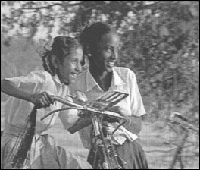|
|
| Director: Shabnam Virmani Script: Shabnam Virmani, Shalini Nair, women activists of Ekta Parishad Photography: Rahul Roy Editing: H.K.Desai Music: Deval Mehta Sound: Shivaji Sawant Production Company, Source: DRISTI MEDIA GROUP B-1, Divya apts. opp. Shradha Petrol Pump Bodakdev,Ahmedabad, Gujarat, 380054 INDIA Phone: 91-79-6741437 / Fax: 91-79-6750977 e-mail: drishti@ad1.vsnl.net.in INDIA / 1996 / Hindi / Color / Video / 49 min |
Worked with the Times of India daily in Jaipur as a journalist. Reporting on a Sati (widow self-immolation) in rural Rajasthan triggered off an abiding interest in women's development issues. Did a Master's in Development Communication from Cornell University, USA, returned to India and has been making films ever since in close collaboration with the women's movement in her country. Initiated and works with the Drishti Media Collective in Ahmedabad, a group of video and theatre professionals working on women's and human rights concerns. |
 |
|
| Simple words and glowing faces depict the story of three women social workers who triumph over personal loss and tragedy to empower themselves and other women in need, in the face of complex discriminatory mechanisms in Madhya Pradesh in India. A recurring theme song highlights the spirit and courage of the activists who pave new paths for the future. | |
|
|
|
|
Director's Statement My work has been motivated in a very fundamental way by the women's movement in my country, India. I have primarily used video as a via media for expression of women's experiences. To see my films being watched and discussed by women of different cultures, to get a sense of it making a difference to their lives, their self-perception, their world-view, is the greatest satisfaction I derive from my work. I would like to stress that I make films "with" and not "on" women, and this methodology has emerged from a conscious need to strengthen and support women's struggles. The filmmaking Process must not reduce women into passive "objects," but involve them as active "subjects" in the film process. This Process has to be a mutually enriching experience for the filmmaker and the women involved, not just be a means to an end Product. I enjoy making films that involve my subjects (women) in the research, script and acting of the filmmaking process. And in that sense, my films are much less intensely "personal" expressions, and much more "collective" expressions of social reality. |
|
